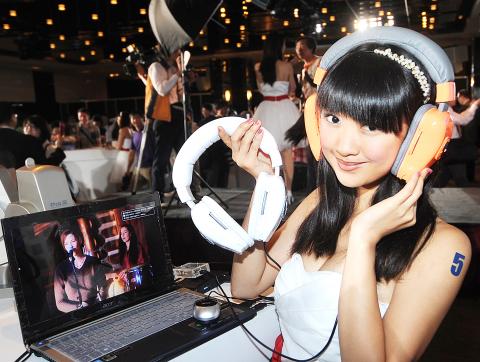This year’s Computex is expected to provide visitors the earliest opportunities in the world to put their hands on a variety of Windows 8 devices, an executive of the show’s co-organizer said yesterday.
“As Windows 8 works across a number of different platforms, visitors can expect to see a variety of Windows 8 devices at the upcoming Computex,” Taipei Computer Association (TCA, 台北市電腦公會) deputy secretary-general Chang Li (張笠) said on the sideline of a product award ceremony. “Visitors can also expect to see devices running the operating system’s preview version, such as tablets for medical, military and security purposes.”
Taiwanese information technology companies are good at making tablet and notebook PCs and that is where they have focused in developing Windows 8 devices, Chang said.

Photo: Fang Pin-chao, Taipei Times
More than 10 brand vendors and original design manufacturers across platforms will debut their first Windows 8 devices at this year’s Computex, which is set to be held at the Taipei World Trade Center Exhibition Halls 1 to 3 and the Taipei International Convention Center in Xinyi District (信義) as well as Nangang Exhibition Hall, from Tuesday through Saturday next week.
Asustek Computer Inc (華碩) plans to unveil a number of 10.1-inch tablet PCs running on the touch-enabled Windows 8 operating system at Computex, with a 1366x768 resolution, which is lower than what Asustek’s current premium lines use. This is because Microsoft has asked manufacturers to follow certain specifications when producing the first wave of Windows 8 tablets, according to the company.
Unlike in the past few years, British investment bank Barclays PLC expects this year’s expo to generate more excitement, as in 2007 when netbooks were first introduced.
“We will, for the first time, be able to see actual working PCs running on Windows 8 [preview version], in addition to various models of Ultrabooks running Intel Corp’s Ivy Bridge CPU,” Kirk Yang (楊應超), an analyst at Barclays in Hong Kong, wrote in a note.
TCA, the co-organizer of the annual trade show, yesterday hosted a pre-show conference that showcased winning products of the 11th Best Choice Award BC Award.
There were 425 product entries for this year’s BC Awards selection and 37 of them were recognized as winning products, with nine crowned the Golden Award. TCA said this year’s winning products feature thin-light, portable and mobile computing qualities.
The nine Golden Award winners include AAEON Technology’s (研揚科技) IP65 Rugged Tablet Computer, Asustek’s Transformer Pad TF700 series and PadFone, and Elan Microelectronics Corp’s (義隆電子) Smart-Touchscreen.
Asustek’s Transformer Pad TF700KL is the company’s second tablet computer supporting 4G wireless broadband communication. The tablet will hit stores in the US and Europe next month.

In Italy’s storied gold-making hubs, jewelers are reworking their designs to trim gold content as they race to blunt the effect of record prices and appeal to shoppers watching their budgets. Gold prices hit a record high on Thursday, surging near US$5,600 an ounce, more than double a year ago as geopolitical concerns and jitters over trade pushed investors toward the safe-haven asset. The rally is putting undue pressure on small artisans as they face mounting demands from customers, including international brands, to produce cheaper items, from signature pieces to wedding rings, according to interviews with four independent jewelers in Italy’s main

Japanese Prime Minister Sanae Takaichi has talked up the benefits of a weaker yen in a campaign speech, adopting a tone at odds with her finance ministry, which has refused to rule out any options to counter excessive foreign exchange volatility. Takaichi later softened her stance, saying she did not have a preference for the yen’s direction. “People say the weak yen is bad right now, but for export industries, it’s a major opportunity,” Takaichi said on Saturday at a rally for Liberal Democratic Party candidate Daishiro Yamagiwa in Kanagawa Prefecture ahead of a snap election on Sunday. “Whether it’s selling food or

CONCERNS: Tech companies investing in AI businesses that purchase their products have raised questions among investors that they are artificially propping up demand Nvidia Corp chief executive officer Jensen Huang (黃仁勳) on Saturday said that the company would be participating in OpenAI’s latest funding round, describing it as potentially “the largest investment we’ve ever made.” “We will invest a great deal of money,” Huang told reporters while visiting Taipei. “I believe in OpenAI. The work that they do is incredible. They’re one of the most consequential companies of our time.” Huang did not say exactly how much Nvidia might contribute, but described the investment as “huge.” “Let Sam announce how much he’s going to raise — it’s for him to decide,” Huang said, referring to OpenAI

The global server market is expected to grow 12.8 percent annually this year, with artificial intelligence (AI) servers projected to account for 16.5 percent, driven by continued investment in AI infrastructure by major cloud service providers (CSPs), market researcher TrendForce Corp (集邦科技) said yesterday. Global AI server shipments this year are expected to increase 28 percent year-on-year to more than 2.7 million units, driven by sustained demand from CSPs and government sovereign cloud projects, TrendForce analyst Frank Kung (龔明德) told the Taipei Times. Demand for GPU-based AI servers, including Nvidia Corp’s GB and Vera Rubin rack systems, is expected to remain high,